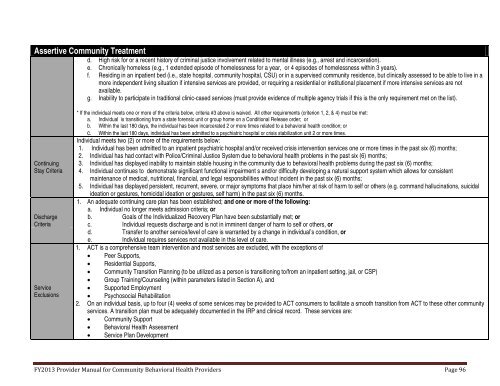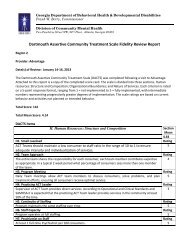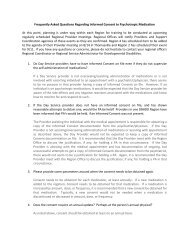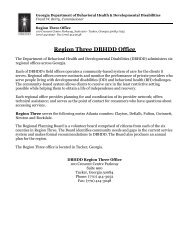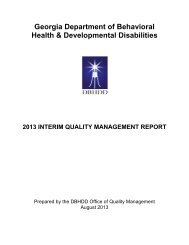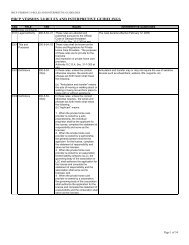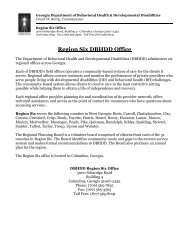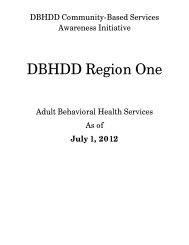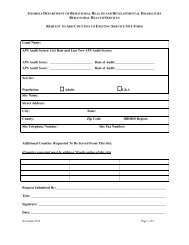Assertive Community Treatmentd. High risk for or a recent history <strong>of</strong> criminal justice involvement related to mental illness (e.g., arrest <strong>and</strong> incarceration).e. Chronically homeless (e.g., 1 extended episode <strong>of</strong> homelessness for a year, or 4 episodes <strong>of</strong> homelessness within 3 years).f. Residing in an inpatient bed (i.e., state hospital, community hospital, CSU) or in a supervised community residence, but clinically assessed to be able to live in amore independent living situation if intensive services are provided, or requiring a residential or institutional placement if more intensive services are notavailable.g. Inability to participate in traditional clinic-cased services (must provide evidence <strong>of</strong> multiple agency trials if this is the only requirement met on the list).ContinuingStay CriteriaDischargeCriteriaServiceExclusions* If the individual meets one or more <strong>of</strong> the criteria below, criteria #3 above is waived. All other requirements (criterion 1, 2, & 4) must be met:a. Individual is transitioning from a state forensic unit or group home on a Conditional Release order; orb. Within the last 180 days, the individual has been incarcerated 2 or more times related to a behavioral health condition; orc. Within the last 180 days, individual has been admitted to a psychiatric hospital or crisis stabilization unit 2 or more times.Individual meets two (2) or more <strong>of</strong> the requirements below:1. Individual has been admitted to an inpatient psychiatric hospital <strong>and</strong>/or received crisis intervention services one or more times in the past six (6) months;2. Individual has had contact with Police/Criminal Justice System due to behavioral health problems in the past six (6) months;3. Individual has displayed inability to maintain stable housing in the community due to behavioral health problems during the past six (6) months;4. Individual continues to demonstrate significant functional impairment s <strong>and</strong>/or difficulty developing a natural support system which allows for consistentmaintenance <strong>of</strong> medical, nutritional, financial, <strong>and</strong> legal responsibilities without incident in the past six (6) months;5. Individual has displayed persistent, recurrent, severe, or major symptoms that place him/her at risk <strong>of</strong> harm to self or others (e.g. comm<strong>and</strong> hallucinations, suicidalideation or gestures, homicidal ideation or gestures, self harm) in the past six (6) months.1. An adequate continuing care plan has been established; <strong>and</strong> one or more <strong>of</strong> the following:a. Individual no longer meets admission criteria; orb. Goals <strong>of</strong> the Individualized Recovery Plan have been substantially met; orc. Individual requests discharge <strong>and</strong> is not in imminent danger <strong>of</strong> harm to self or others, ord. Transfer to another service/level <strong>of</strong> care is warranted by a change in individual’s condition, ore. Individual requires services not available in this level <strong>of</strong> care.1. ACT is a comprehensive team intervention <strong>and</strong> most services are excluded, with the exceptions <strong>of</strong>• Peer Supports,• Residential Supports,• Community Transition Planning (to be utilized as a person is transitioning to/from an inpatient setting, jail, or CSP)• Group Training/Counseling (within parameters listed in Section A), <strong>and</strong>• Supported Employment• Psychosocial Rehabilitation2. On an individual basis, up to four (4) weeks <strong>of</strong> some services may be provided to ACT consumers to facilitate a smooth transition from ACT to these other communityservices. A transition plan must be adequately documented in the IRP <strong>and</strong> clinical record. These services are:• Community Support• <strong>Behavioral</strong> <strong>Health</strong> Assessment• Service Plan DevelopmentFY2013 Provider Manual for Community <strong>Behavioral</strong> <strong>Health</strong> Providers Page 96
Assertive Community Treatment• Diagnostic Assessment• Physician Assessment (specific to engagement only)• Individual Counseling (specific to engagement only)3. ACT recipients who also receive a DBHDD Residential Service may not receive ACT-provided skills training which is a part <strong>of</strong> the “residential” service. The ACTprovider shall be in close coordination with the Residential provider such that there is no duplication <strong>of</strong> services supports/efforts.ClinicalExclusionsRequiredComponents4. Those receiving Medicaid DD Waivers are excluded from the service.Individuals with the following conditions are excluded from admission unless there is clearly documented evidence <strong>of</strong> psychiatric condition overlaying the primarydiagnosis: developmental disability, autism, organic mental disorder, substance-related disorder.1. Assertive Community Treatment must include a comprehensive <strong>and</strong> integrated set <strong>of</strong> medical <strong>and</strong> psychosocial services provided in non-<strong>of</strong>fice settings 80% <strong>of</strong> thetime by a mobile multidisciplinary team. The team must provide community support services interwoven with treatment <strong>and</strong> rehabilitative services <strong>and</strong> regularlyscheduled team meetings which will be documented in the served individual’s medical record.2. Ideally, <strong>and</strong> in accordance with the Dartmouth Assertive Community Treatment Scale (DACTS), the Treatment Team meeting must be held a minimum <strong>of</strong> 4 times aweek with time dedicated to discussion <strong>of</strong> support to a specific individual, <strong>and</strong> documentation in the log <strong>of</strong> the Treatment Team Meetings as indicated in theDocumentation Requirements section below. Each consumer must be discussed, even if briefly, in each Treatment Team Meeting. The Treatment Team Meetingsare to review the status <strong>of</strong> all consumers <strong>and</strong> the outcome <strong>of</strong> the most recent staff contacts, develop a master staff work schedule for the day’s activities, <strong>and</strong> all ACTteam members are expected to attend; exception <strong>of</strong> nonattendance can be made <strong>and</strong> documented by the Team Leader. Effective 7/1/11, the psychiatrist mustparticipate at least one time/week in the ACT team meetings.3. In accordance with NAMI ACT best practice, each ACT team will identify an Individual Treatment Team (ITT) for each enrolled ACT consumer.4. Services <strong>and</strong> interventions must be individually tailored to the needs, goals, preferences <strong>and</strong> assets <strong>of</strong> the individual with the goals <strong>of</strong> maximizing independence <strong>and</strong>recovery as defined by the consumer.5. At least 80% <strong>of</strong> all service units must involve face-to-face contact with consumers. Eighty percent (80%) or more <strong>of</strong> face-to-face service units must be provided outside<strong>of</strong> program <strong>of</strong>fices in locations that are comfortable <strong>and</strong> convenient for consumers (including the individual’s home, based on individual need <strong>and</strong> preference <strong>and</strong>clinical appropriateness).6. During the course <strong>of</strong> treatment, it is recommended that the ACT Team provide for some individuals at least 5 face-to-face contacts per week based on the personsmental health acuity. However, all individuals participating in ACT must receive a minimum <strong>of</strong> 12 face-to-face contacts per month. The Team must see eachindividual at least once a month for symptom assessment/management <strong>and</strong> management <strong>of</strong> medications.7. During discharge transition, it is recommended that the ACT Team provide at least 3 face-to-face contacts per week for most individuals on an ongoing basis. Allindividuals participating in ACT transitioning must receive a minimum <strong>of</strong> 4 face-to-face contacts per month. The Team must see each individual at least once a monthfor symptom assessment/management <strong>and</strong> medication management.8. Service may be delivered by a single team member to 2 ACT consumers at the same time if their goals are compatible, however, this cannot be a st<strong>and</strong>ard practice.Services cannot be <strong>of</strong>fered to more than 2 individuals at a time (exception: Item A.8.).9. ACT recipients can receive limited Group Training/Counseling (up to 8 units/week) when a curriculum-based therapeutic group is <strong>of</strong>fered such as Dialectical<strong>Behavioral</strong> Therapy (DBT), Motivational Enhancement, or Integrative Dual Diagnosis Treatment (IDDT). For this to be allowable, the ACT participants must haveclinical needs <strong>and</strong> recovery goals that justify intervention by staff trained in the implementation <strong>of</strong> the specific curriculum-based therapy.a. This group may be <strong>of</strong>fered to no more than 10 ACT participants at one time <strong>and</strong> must be directed by no fewer than 2 staff in order to be billed as a Group.b. This group contains no less than 3 consumers <strong>and</strong> no more than 10 consumers.FY2013 Provider Manual for Community <strong>Behavioral</strong> <strong>Health</strong> Providers Page 97
- Page 1 and 2:
Georgia Department of Behavioral He
- Page 3 and 4:
UPDATED FOR JULY 1, 2013SUMMARY OF
- Page 5 and 6:
C&A Core ServicesBehavioral Health
- Page 7 and 8:
Community Supportsupports;9) Assist
- Page 9 and 10:
Community SupportServiceAccessibili
- Page 11 and 12:
Community Transition Planningv. App
- Page 13 and 14:
Diagnostic AssessmentTransactionCod
- Page 15 and 16:
Family Outpatient Services: Family
- Page 17 and 18:
Family Outpatient Services: Family
- Page 19 and 20:
Family Outpatient Services: Family
- Page 21 and 22:
Group Outpatient Services: Group Co
- Page 23 and 24:
Group Outpatient Services: Group Tr
- Page 25 and 26:
Individual CounselingServiceDefinit
- Page 27 and 28:
Medication AdministrationAdmissionC
- Page 29 and 30:
Nursing Assessment and Health Servi
- Page 31 and 32:
Continuing StayCriteriaDischargeCri
- Page 33 and 34:
Psychiatric TreatmentAdditionalMedi
- Page 35 and 36:
Service Plan DevelopmentPractitione
- Page 37 and 38:
CHILD & ADOLESCENT SPECIALTY SERVIC
- Page 39 and 40:
Behavioral AssistanceAssistance.Ser
- Page 41 and 42:
Crisis Stabilization Unit (CSU) Ser
- Page 43 and 44:
Crisis Stabilization Unit (CSU) Ser
- Page 45 and 46: Intensive Family Intervention5. Bec
- Page 47 and 48: Intensive Family Interventionconfid
- Page 49 and 50: Intensive Family Intervention10. Th
- Page 51 and 52: Structured Activity SupportsService
- Page 53 and 54: Structured Residential SupportsClin
- Page 55 and 56: Substance Abuse Intensive Outpatien
- Page 57 and 58: Substance Abuse Intensive Outpatien
- Page 59 and 60: Substance Abuse Intensive Outpatien
- Page 61 and 62: RequiredComponents1. Any diagnosis
- Page 63 and 64: Community Support3. Contact must be
- Page 65 and 66: Community Transition Planning3. Jai
- Page 67 and 68: ContinuingStay CriteriaDischargeCri
- Page 69 and 70: Family Outpatient Services: Family
- Page 71 and 72: Family Outpatient Services: Family
- Page 73 and 74: Family Outpatient Services: Family
- Page 75 and 76: Group Outpatient Services: Group Co
- Page 77 and 78: Group Outpatient Services: Group Tr
- Page 79 and 80: Individual CounselingServiceDefinit
- Page 81 and 82: StaffingRequirementsServiceAccessib
- Page 83 and 84: Medication Administrationliving.Req
- Page 85 and 86: Nursing Assessment and Health Servi
- Page 87 and 88: Psychiatric Treatmentbehaviormodify
- Page 89 and 90: Psychological Testing: Psychologica
- Page 91 and 92: Service Plan DevelopmentRecovery pl
- Page 93 and 94: Ambulatory Substance Abuse Detoxifi
- Page 95: Assertive Community Treatmente. Ass
- Page 99 and 100: Assertive Community Treatment• di
- Page 101 and 102: Assertive Community Treatment11. Fo
- Page 103 and 104: Assertive Community Treatmentin whi
- Page 105 and 106: Consumer/Family AssistanceTransacti
- Page 107 and 108: Consumer/Family Assistancecriticaln
- Page 109 and 110: Crisis Stabilization Unit Servicesb
- Page 111 and 112: ClinicalExclusionsDocumentationRequ
- Page 113 and 114: Peer Support Services4. Individual
- Page 115 and 116: Peer Support ServicesClinicalOperat
- Page 117 and 118: Psychosocial RehabilitationUnit Val
- Page 119 and 120: Psychosocial Rehabilitationmust dem
- Page 121 and 122: Psychosocial RehabilitationBilling
- Page 123 and 124: Residential: Independent Residentia
- Page 125 and 126: Residential: Intensive Residential
- Page 127 and 128: Residential: Semi-Independent Resid
- Page 129 and 130: Residential Substance Detoxificatio
- Page 131 and 132: ServiceDefinitionAdmissionCriteriaC
- Page 133 and 134: AdmissionCriteria,continuedContinui
- Page 135 and 136: 1. It is expected that the transiti
- Page 137 and 138: DocumentationRequirements1. Every a
- Page 139 and 140: FY2013 Provider Manual for Communit
- Page 141 and 142: TABLE B: Physicians, Physician’s
- Page 143 and 144: COMMUNITY SERVICE STANDARDS FOR ALL
- Page 145 and 146: 3. The provider details the desired
- Page 147 and 148:
7. The provider’s practice of cul
- Page 149 and 150:
c. Is not permitted in developmenta
- Page 151 and 152:
2. Policies, procedures, and guidel
- Page 153 and 154:
3. Safe transport of persons served
- Page 155 and 156:
iv. There are safeguards utilized f
- Page 157 and 158:
i. The date and time the medication
- Page 159 and 160:
Training Requirements for all Staff
- Page 161 and 162:
Qualified MedicationAide (QMA)Psych
- Page 163 and 164:
Addiction CounselorTrainees (ACT)Hi
- Page 165 and 166:
CADC, CCADC, CAC II or MAC and is r
- Page 167 and 168:
practitioner), s/he could bill as a
- Page 169 and 170:
COMMUNITY SERVICE STANDARDS FOR ALL
- Page 171 and 172:
4. ORDER/RECOMMENDATION FOR COURSE
- Page 173 and 174:
ii. Services, supports, and treatme
- Page 175 and 176:
xv.xvi.xvii.Recorded changes - Any


